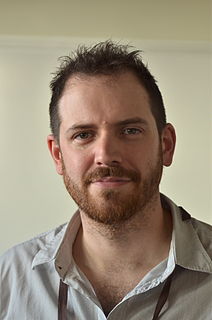A Quote by Clive Thompson
Novelists in particular love to rhapsodize about the glory of the solitary mind; this is natural, because their job requires them to sit in a room by themselves for years on end. But for most of the rest of us, we think and remember socially.
Related Quotes
Teachers who have plugged away at their jobs for twenty, thirty, and forty years are heroes. I suspect they know in their hearts they've done a good thing, too, and are more satisfied with themselves than most people are. Most of us end up with no more than five or six people who remember us. Teachers have thousands of people who remember them for the rest of their lives.
Whatever happened billions of years ago, that's what were we come from. For people who have hate and anger towards each other just because they've been socially conformed or socially... conditioned to their particular country, doesn't mean that you're not like everyone else in the rest of the world and doesn't mean you should go around hating everybody.
When we have an experience -- hearing a particular sonata, making love with a particular person, watching the sun set from a particular window of a particular room -- on successive occasions, we quickly begin to adapt to it, and the experience yields less pleasure each time. Psychologists call this habituation, economists call it declining marginal utility, and the rest of us call it marriage
I think most interesting people are socially awkward even if they're able to hide it most of the time. If Henry Darger hadn't been a shut-in would we love him so much? Any act that we do in private is amazing and profound because it is private. You don't have to worry about being socially awkward in the privacy of your own home... well, unless I show up.
I think there's a longer shortlist for that particular position and others.Highly qualified men and women who have come to Bedminster, come to Trump Tower. People of different races and ethnicities. All political persuasions. People who have different backgrounds, public sector, private sector. Most of them will not be in the cabinet. Most of them are coming because they love the country and they want to share what their work on a particular issue or a particular success story has been.
We exchanged a couple of ideas and stuff like that, but that's about it. I just think ... consulting on 'Tintin' was very interesting because you try to ... not educate, but inform the animators [about] what the lighting looks like, but [in the end] they do it themselves. I don't actually go and sit there with them. [We] just had a couple of conversations.
The rest-the vast majority, tens of thousands of days-are unremarkable, repetitive, even monotonous. We glide through them then instantly forget them. We tend not to think about this arithmetic when we look back on our lives. We remember the handful of Big Days and throw away the rest.
We organize our long, shapeless lives into tidy little stories...But our lives are mostly made up of junk, of ordinary, forgettable days, and 'The End' is never the end.
Only it’s just the same. In fact, do you know, because of all that pressure, and worry, and fear, it’s worse. There aren’t many men who think clearest when the stakes are highest. So people are even stupider in a war than the rest of the time. Thinking about how they’ll dodge the blame, or grab the glory, or save their skins, rather than about what will actually work There’s no job that forgives stupidity more than soldiering. No job that encourages it more.































